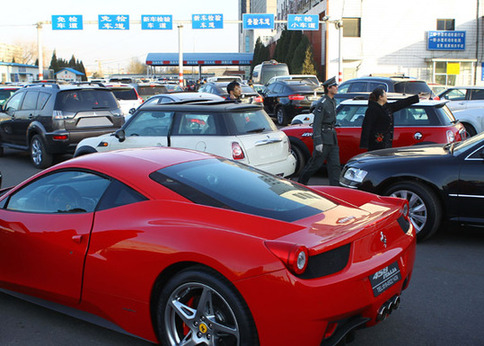Beijing to announce traffic rules
The capital city is expected to release a package of detailed rules on Thursday to ease its growing traffic gridlock, including axing new car license plates from next year.
| ?
|
|
A backlog of cars are waiting to be inspected on Wednesday in Beiyuan, northern Beijing, as car owners rush to apply for license plates before an expected limit takes effect next year. [China Daily] |
The Beijing Municipal Commission of Transport is scheduled to hold a press conference at 3 pm. Though no official information was available in advance, a rumor was circulating that the city will take a leaf out of Shanghai's book and limit license plates.
The city will only grant 150,000 license plates next year and a resident without a Beijing permanent residence permit will need to provide proof of having paid local taxes for five consecutive years to purchase a car, the Economic Observer News reported an unnamed city transport official as having said.
Another rumor swirling around suggested that 240,000 license plates will be permitted next year.
If it proves to be true, the number of new cars in Beijing next year will be cut by at least two-thirds compared to this year, when Beijing had 4.76 million vehicles as of Dec 19, 700,000 more than at the beginning of 2010, according to official figures.
The rumors have fueled public concern that it will be more expensive to get a new car next year, which fueled car sales to those who want to register their plates before the end of the year.
Car ownership in the city increased 30,000 just in the past week, with a maximum addition of 5,000 cars per day, according to figures from the Beijing Municipal Commission of Transport.
Chi Yifeng, general manager of Yayuncun Automobile Trade Market, the biggest dealership in Beijing, said daily car sales this week doubled those over the past two weeks and that he is worried the current buying frenzy will hit sales in the first quarter of 2011.
According to Chi, there are more than 460 car dealerships in Beijing and, if the rumor about license plates being limited to 240,000 proves to be true, a number of them will struggle to survive, which will have a knock-on effect on allied industries, such as repair services and insurance.
Wang Ruichao, a marketing manager at a Toyota dealership in Beijing, said he is worried that business will suffer if the number of license plates is limited.
"If only 20,000 licenses are granted a month, each dealership will only sell an average of 40 cars a month, which will be a big blow to us," he said.
Earlier this month, the Municipal Commission of Transport released a draft plan on clearing traffic congestion, which was posted online to gauge public reaction from Dec 13 to 19.
More than 3,000 responses were received from members of the public and only 5.8 percent of the respondents opposed the plan, while others made their own suggestions, according to the commission's website.
Respondents who opposed the plan were dissatisfied with proposals to restrict car use, the number of new cars allowed on the road and a congestion charge.
The draft plan also included measures to prohibit new government cars, increase the pace of building the transport infrastructure and expanding public transportation.
When necessary, it also suggested resorting to the measure used during the Olympic Games of restricting the number of cars on the road during peak hours on the basis of odd and even final license plate numbers.
No details were available in the draft on a possible start date for the proposed congestion charge and what concrete measures will be taken to prevent car ownership from increasingly too rapidly.
"The draft plan is just a framework. Its lack of detail has made the public feel uncertain about the measures that are likely to be taken," said Zhang Changqing, director of the transportation law institute at Beijing Jiaotong University.
"Its ambiguity may have misled the public and even created some panic," he said, calling for the government to be more open and transparent in formulating policies that affect every household.
 0
0 







